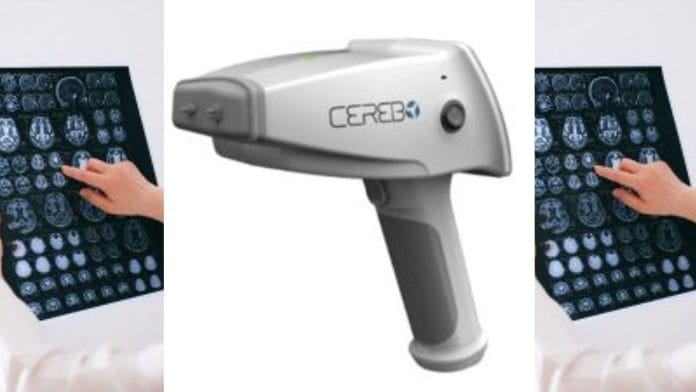New Delhi: India’s top health research agency—the Indian Council of Medical Research (ICMR)—is urging states to purchase and deploy a fully made-in-India hand-held portable device that can detect serious and life-threatening brain injuries within two minutes and can dramatically reduce trauma related deaths and morbidities.
The cutting-edge device, now registered under the brand name CEREBO, has been developed through a collaboration between ICMR’s Medical Device and Diagnostics Mission Secretariat, AIIMS Bhopal, the National Institute of Mental Health and Neurosciences and Bioscan Research.
The device, which looks like a hair-dryer, said ICMR director general Dr Rajiv Bahl, is the smallest tool anywhere in the world, capable of detecting internal brain bleeds in a cost-effective manner, even in resource-constrained settings.
Though developed in 2023, the devise has not yet become popular largely due to lack of awareness and poor marketing.
Traumatic brain injuries are a significant public health challenge, particularly in emergency settings, rural areas, and underserved populations where advanced diagnostic tools like Computer Tomography (CT) or Magnetic Resonance Imaging (MRI) scans are inaccessible or delayed, the ICMR head added.
Brain bleeds can be life-threatening and cause permanent brain damage and the severity and outcome of a brain bleed depends on its cause, location inside the skull, size of the bleed, the amount of time that passes between the bleed and treatment.
According to estimates, India reports the highest rate of head injuries in the world—mainly due to accidents and falls, apart from sport injuries—and more than 1,00,000 lives are lost every year. One out of 6 trauma victims die, while over 1 million suffer from serious head injuries annually.
Statistics also show that over 90 percent trauma victims in India do not receive optimal care during the ‘golden hour’ period after an injury is sustained, in which healthcare administration is critical.
The outcome of traumatic brain injury is drastically correlated to the response of pre-hospital care and rehabilitation and 30 percent of those who currently die from head injuries, scientific studies have shown, could be saved if quality care were available to them sooner.
“This device, if used in tier-3 cities and rural areas, can immensely help reduce the burden of deaths and morbidities due to traumas. We, therefore, want states to utilise the tool on a wider scale and effectively,” Dr Bahl said.
The tool costs about Rs 15 lakh—much less than MRI and CT scan machines, which can cost up to crores, the ICMR head said.
Needs minimal training to operate
CEREBO, the non-invasive brain injury diagnostic tool, has been developed using advanced near-infrared spectroscopy technology powered by machine learning.
Capable of detecting intracranial bleeding and edema within two minutes, the device provides colour-coded (with different colours indicating direction and speed of blood flow), radiation-free, and cost-effective results.
Designed for deployment in ambulances, trauma centers, rural clinics, and disaster response units, the tool, now approved and validated by the Central Drugs Standard Control Organisation (CDSCO) following feasibility studies, enhances early traumatic brain injury detection and patient outcomes.
This innovative technology is based on the well-established science that correlates the optical density of near infrared light with hemoglobin concentration, explained a scientist who has worked on developing the device.
One of the key advantages of the brain bleed detector, the scientist said, is its advanced mathematics-based algorithm, which eliminates the need for expert data interpretation.
In addition to its user-friendly algorithm, the portable intracranial bleed detector also features self-calibration and an intuitive user interface.
These features make the device incredibly easy to use, further enhancing its usability and accessibility, the scientist pointed out, stressing that it is miniaturised, addressing the limitations of traditional tools such as MRI and CT scans that are often bulky and expensive.
“This compact design allows for point-of-care detection, making it suitable for use in military, sports, emergency, or urgent care environments. Also, even individuals with minimal training can effectively use the device and this feature makes CEREBO a valuable tool in various healthcare settings, as it can be operated with basic medical training without the need for specialised expertise,” he added.
The developers of the device are looking to supply not only in India but also internationally.
It is specifically engineered to meet the needs of healthcare professionals in different countries, including countries such as Nigeria, Kenya, South Africa, apart from Gulf nations and others, they said.
(Edited by Viny Mishra)
Also read: 92% of rural households’ hospitalisation costs are out of pocket, 77% for urban families—govt data






